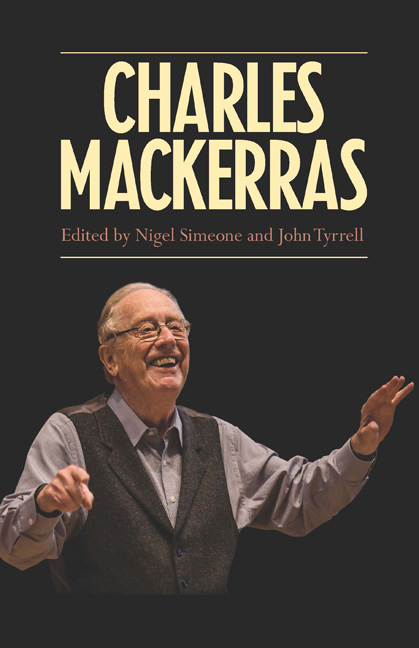Book contents
- Frontmatter
- Dedication
- Contents
- List of Illustrations
- List of Abbreviations
- Preface and Acknowledgments
- About the Contributors
- Charles Mackerras: A Chronology
- Prologue: A Eulogy for Charles
- 1 An Immense Stylist Evolves: 1947–87
- 2 A Personal Portrait of Charles Mackerras
- 3 Mackerras and Janáček
- 4 Goat's Milk in Vienna: Three Memorable Meetings
- 5 The Lion: Charles Mackerras
- 6 ‘The Musical Values of Opera’: WNO, 1987–92
- 7 Triumphs and Tribulations: Opera, 1993–2001
- 8 Rethinking Old Favourites: Opera, 2002–10
- 9 The Last Great ‘Czech’ Conductor
- 10 Reminiscences of a Friend and Colleague
- 11 Reconstructing a Better Version of The Greek Passion
- 12 Reconstructing Sullivan's Cello Concerto
- 13 Three Orchestras
- 14 Coda
- Appendix 1 Mackerras in Performance
- Appendix 2 Desert Island Lists
- Discography
- Bibliography
- Editions and Arrangements by Charles Mackerras
- Index
9 - The Last Great ‘Czech’ Conductor
Published online by Cambridge University Press: 05 May 2015
- Frontmatter
- Dedication
- Contents
- List of Illustrations
- List of Abbreviations
- Preface and Acknowledgments
- About the Contributors
- Charles Mackerras: A Chronology
- Prologue: A Eulogy for Charles
- 1 An Immense Stylist Evolves: 1947–87
- 2 A Personal Portrait of Charles Mackerras
- 3 Mackerras and Janáček
- 4 Goat's Milk in Vienna: Three Memorable Meetings
- 5 The Lion: Charles Mackerras
- 6 ‘The Musical Values of Opera’: WNO, 1987–92
- 7 Triumphs and Tribulations: Opera, 1993–2001
- 8 Rethinking Old Favourites: Opera, 2002–10
- 9 The Last Great ‘Czech’ Conductor
- 10 Reminiscences of a Friend and Colleague
- 11 Reconstructing a Better Version of The Greek Passion
- 12 Reconstructing Sullivan's Cello Concerto
- 13 Three Orchestras
- 14 Coda
- Appendix 1 Mackerras in Performance
- Appendix 2 Desert Island Lists
- Discography
- Bibliography
- Editions and Arrangements by Charles Mackerras
- Index
Summary
Sir Charles Mackerras's warm relationship with the Czech lands and their musical culture began with his year of study in Prague (described in detail in Chapter 3). He had the great good luck to arrive in Czechoslovakia in September 1947, at a time when the country was still free, and to live only marginally through the period after the Communist coup of February 1948. He was still able to communicate with people whose activities were later proscribed, in particular the conductor Václav Talich, whose political problems began at the end of the war, when he was unjustly accused of collaboration. Paradoxically, this was another stroke of luck for Mackerras, since after February 1948, when Talich was dismissed from the National Theatre, he had more time for teaching. In this way Mackerras got to know the work of the most distinguished Czech conductor of his day, became better acquainted with Czech music and above all with the compositions of Leoš Janáček, whose idiosyncratic music bewitched him. After hearing Talich's version of Kát'a Kabanová he sought out performances of other Janáček works throughout Czechoslovakia, in order to get to know as much as possible of this very individual composer.
Mackerras quickly understood that there were differences in the interpretation of Janáček's orchestral scores in Brno and Prague. The Brno interpretations still carried within them a thirty-year tradition moulded by the conductor Milan Sachs, whereas the Prague performances had a more powerful sound thanks to the revised instrumentation of Václav Talich. When, in the summer of 1948, he left Czechoslovakia (which, owing to the political situation, then became closed to him for many years), Mackerras took with him valuable experience gained from Talich, a detailed knowledge of Czech music and a good knowledge of Czech. Above all, however, he took with him a determination to introduce Janáček's works to the British public and to establish his music there.
- Type
- Chapter
- Information
- Charles Mackerras , pp. 149 - 159Publisher: Boydell & BrewerPrint publication year: 2015



